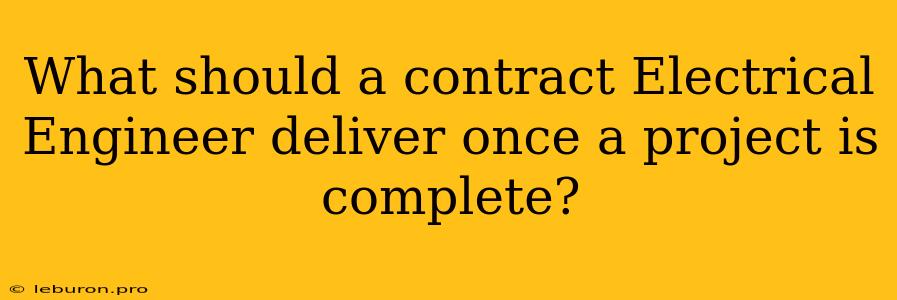The role of a contract Electrical Engineer goes beyond simply designing and implementing electrical systems. They are responsible for ensuring a project's success from conception to completion. This means delivering a comprehensive set of deliverables that encompass all aspects of the electrical system, ensuring it meets the project's requirements and operates safely and efficiently. Understanding what a contract Electrical Engineer should deliver upon project completion is crucial for both the engineer and the client, ensuring a smooth handover and a successful project outcome.
Deliverables for a Contract Electrical Engineer: Ensuring a Successful Project Completion
A contract Electrical Engineer's deliverables are tailored to the specific project requirements. However, there are core components that are typically included in every project, providing a comprehensive set of documentation and tangible outcomes.
Project Documentation: The Foundation of Success
Thorough documentation is the cornerstone of a successful electrical engineering project. It provides a complete record of the design, implementation, and testing phases, ensuring continuity and transparency throughout the project lifecycle.
- Electrical Drawings: These detailed drawings are the blueprints of the electrical system, outlining the layout, components, and connections. They include:
- Single-Line Diagrams: Simplified representations showing the flow of electricity through the system.
- Wiring Diagrams: Detailed depictions of the connection points and wiring paths for each component.
- Panel Schedules: Information about the location, size, and components of electrical panels.
- Lighting Plans: Detailed plans showing the placement and type of lighting fixtures.
- Power Plans: Outlines the distribution of power within the project.
- Specifications: These documents define the technical requirements for all electrical components and systems, ensuring compatibility and quality.
- Calculations: Supporting documentation that demonstrates the engineer's design calculations, ensuring the electrical system meets safety standards and performance criteria.
- Testing and Commissioning Reports: Documented records of the testing process, confirming that the electrical system meets the required standards and operates as designed.
- Operation and Maintenance Manuals: Guides for the ongoing operation, maintenance, and troubleshooting of the electrical system, facilitating long-term performance and safety.
Tangible Outcomes: The Real-World Manifestation of the Design
Beyond documentation, a contract Electrical Engineer delivers tangible outcomes, representing the real-world implementation of their design.
- Installed Electrical Systems: The completed and operational electrical systems, including:
- Wiring: Properly installed and routed electrical wiring, ensuring a safe and efficient power supply.
- Equipment: Installation and commissioning of all electrical equipment, including panels, transformers, switches, and other components.
- Lighting Systems: Complete and functioning lighting systems, meeting the project's specific illumination requirements.
- As-Built Drawings: Updated versions of the original drawings, reflecting any changes made during the construction process. This ensures accurate documentation for future maintenance and upgrades.
- Warranty Documents: Providing the client with all necessary warranty information for installed equipment, ensuring seamless repair and replacement should the need arise.
Additional Deliverables: Expanding the Scope of Project Success
Depending on the project's complexity and specific requirements, a contract Electrical Engineer may also deliver additional deliverables:
- Energy Efficiency Analysis: An evaluation of the project's electrical system's energy consumption, identifying opportunities for improvement and recommending solutions.
- Safety Compliance Documentation: Demonstrating compliance with relevant electrical safety codes and regulations, ensuring the project meets the highest safety standards.
- Project Management Documents: Including project schedules, budget reports, and meeting minutes, providing a comprehensive overview of the project's progress and management.
- Training Materials: Providing the client with training materials and manuals on the operation and maintenance of the electrical system, ensuring effective handover and ongoing management.
Conclusion: Delivering a Complete Package for Success
A contract Electrical Engineer's deliverables are essential for ensuring a successful project outcome. By providing comprehensive documentation, tangible outcomes, and potential additional deliverables, they contribute to the project's smooth operation, safety, and long-term performance. Understanding the scope of a contract Electrical Engineer's responsibilities and deliverables is crucial for both clients and engineers, ensuring a clear understanding of expectations and a successful partnership for every project.
